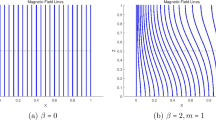Abstract
We describe some new preconditioning strategies for handling the algebraic systems of equations that arise from discretization of the incompressible Navier-Stokes equations. We demonstrate how these methods adapt in a straightforward manner to decisions on implicit or explicit time discretization, explore their use on a collection of benchmark problems, and show how they relate to classical techniques such as projection methods and SIMPLE.
Similar content being viewed by others
References
Bramble, J. H., and Pasciak, J. E. (1995). Iterative techniques for time dependent Stokes problems. In Habashi, W.,Solution Techniques for Large-Scale CFD Problems, John Wiley, New York, p. 201–216.
Cahouet, J., and Chabard, J.-P. (1988). Some fast 3D finite element solvers for the generalized Stokes problem.Int. J. Numer. Meth. Fluids,8, 869–895.
Chorin, A. J. (1968). Numerical solution of the Navier-Stokes equations.Math. Comp. 22, 745–762.
Dukowicz, J. K., and Dvinsky, A. S. (1992). Approximate factorization as a high order splitting for implicit incompressible flow equations.J. Comput. Phys. 102, 336–347.
Elman, H., and Silvester, D. (1996). Fast nonsymmetric iterations and preconditioning for Navier-Stokes equations.SIAM J. Sci. Comput. 17, 33–46.
Elman, H. C. (1996). Multigrid and Krylov subspace methods for the discrete Stokes equations.Int. J. Numer. Meth. Fluids 227, 755–770.
Elman, H. C. (1999). Preconditioning for the steady-state Navier-Stokes equations with low viscosity.SIAM J. Sci. Comput. 20, 1299–1316.
Elman, H. C. (2002). Preconditioners for saddle point problems arising in computational fluid dynamics.Appl. Numer. Math. 43, 75–89.
Elman, H. C., Howle, V. E., Shadid, J., and Tuminaro, R. (2003). A parallel block multilevel preconditioner for the 3D incompressible Navier-Stokes equations.J. Comput. Phys. 187, 505–523.
Elman, H. C., Howle, V. E., Shadid, J., and Tuminaro, R. (2003). In preparation.
Elman, H. C., Silvester, D. J., and Wathen, A. J. (2002). Performance and analysis of saddle point preconditioners for the discrete steady-state Navier-Stokes equations.Numer. Math. 90, 665–688.
Faber, V., and Manteuffel, T. A. (1984). Necessary and sufficient conditions for the existence of a conjugate gradient method.SIAM J. Numer. Anal,21, 352–362.
Faber, V., and Manteuffel, T. A. (1987). Orthogonal error methods.SIAM J. Numer. Anal 24, 170–187.
Girault, V., and Raviart, P. A. (1986).Finite Element Approximation of the Navier-Stokes Equations. Springer-Verlag, New York.
Greenbaum, A. (1997).Iterative Methods for Solving Linear Systems. SIAM, Philadelphia.
Henriksen, M. O., and Holmen, J. (2002). Algebraic splitting for incompressible Navier-Stokes equations.J. Comput. Phys.,175, 438–453.
Hughes, T. J., and Franca, L. P. (1987). A new finite element formulation for computational fluid dynamics: VII. The Stokes problem with various well-posed boundary conditions: Symmetric formulations that converge for all velocity/pressure spaces.Comp. Meths. Appl. Mech. Engrg. 65, 85–96.
Karniadakis, G. E., Israeli, M., and Orszag, S. (1991). High-order splitting methods for the incompressible Navier-Stokes equations.J. Comput. Phys. 97, 414–443.
Kay, D., Loghin, D., and Wathen, A. (2002). A preconditioner for the steady-state Navier-Stokes equations.SIAM J. Sci. Comput. 24, 237–256.
Kechkar, N., and Silvester, D. (1992). Analysis of locally stabilized mixed finite element methods for the Stokes problem.Math. Comp. 58, 1–10.
Loghin, D. (2001). Analysis of Preconditioned Picard Iterations for the Navier-Stokes Equations. Technical Report 01/10, Oxford University Computing Laboratory.
Nicolaides, R. A. (1992). Analysis and convergence of the MAC scheme I.SIAM J. Numer. Anal. 29, 1579–1591.
Paige, C. C., and Saunders, M. A. (1975). Solution of sparse indefinite systems of linear equations.SIAM. J. Numer. Anal. 12, 617–629.
Patankar, S. V., and Spalding, D. B. (1972). A calculation proedure for heat and mass transfer in three-dimensional parabolic flows.Int. J. Heat and Mass Transfer 15, 1787–1806.
Perot, J. B. (1993). An analysis of the fractional step method.J. Comput. Phys. 108, 51–58.
Rusten, T., and Winther, R. (1992). A preconditioned iterative method for saddle point problems.SIAM J. Matr. Anal. Appl. 13, 887–904.
Saad, Y., and Schultz, M. H. (1986). GMRES: A generalized minimal residual algorithm for solving nonsymmetric linear systems.SIAM J. Sci. Stat. Comput. 7, 856–869.
Silvester, D., Elman, H., Kay, D., and Wathen, A. (2001). Efficient preconditioning of the linearized Navier-Stokes equations for incompressible flow.J. Comp. Appl. Math. 128, 261–279.
Silvester, D., and Wathen, A. (1994). Fast iterative solution of stabilized Stokes systems. Part II: Using block preconditioners.SIAM J. Numer. Anal. 31, 1352–1367.
Silvester, D. J., and Wathen, A. J. (1996). Fast and robust solvers for time-discretised incompressible Navier-Stokes equations. In Griffiths, D. F. and Watson, G. A., editors,Numerical Analysis: Proceedings of the 1995 Dundee Biennial Conference. Longman. Pitman Research Notes in Mathematics Series 344.
Témam, R. (1969). Sur l’approximation de la solution des équations de Navier-Stokes par la méthod des pas fractionnaires (II).Arch. Rational Mech. Anal. 33, 377–385.
Verfürth, R. (1984). A combined conjugate gradient-multigrid algorithm for the numerical solution of the Stokes problem.IMA J. Numer. Anal. 4, 441–455.
Wathen, A., and Silvester, D. (1993). Fast iterative solution of stabilized Stokes systems. Part I: Using simple diagonal preconditioners.SIAM J. Numer. Anal. 30, 630–649.
Wathen, A. J. (1987). Realistic eigenvalue bounds for the Galerkin mass matrix.IMA J. Numer. Anal. 7, 449–457.
Wesseling, P. (2001).Principles of Computational Fluid Dynamics. Springer-Verlag, Berlin.
Author information
Authors and Affiliations
Corresponding author
Rights and permissions
About this article
Cite this article
Elman, H.C. Preconditioning strategies for models of incompressible flow. J Sci Comput 25, 347–366 (2005). https://doi.org/10.1007/BF02728995
Received:
Accepted:
Issue Date:
DOI: https://doi.org/10.1007/BF02728995




